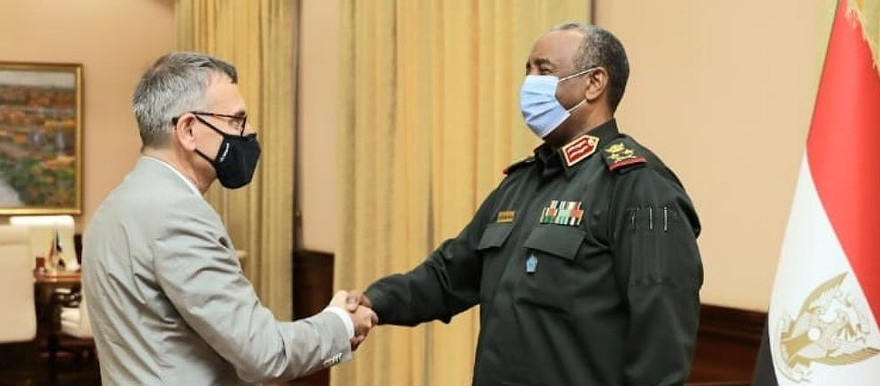Tensions that developed between Sudan’s military and civilian leaders following a thwarted coup on Tuesday last week, have led to the arrival of envoys from South Sudan, France, and the USA. The head of the UN Integrated Mission to Support the Transition in Sudan (UNITAMS) continued his meetings with the members of the Sovereignty Council.
Tut Galuak, Security Advisor to the President of South Sudan and chief mediator for the 2019-2020 Sudanese peace negotiations, arrived yesterday.
In a press statement at Khartoum Airport, Galuak explained that South Sudan President Salva Kiir instructed him to discuss three files, namely the recent political developments in Sudan, the follow up concerning the implementation of the Juba Peace Agreement, and the new negotiation round between the government and the Sudan People’s Liberation Movement-North under the leadership of Abdelaziz El Hilu (SPLM-N El Hilu).
The current situation in Sudan is a source of serious concern for South Sudan, he said. Therefore, the Minister of Foreign Affairs and other South Sudanese officials are accompanying him.
Tensions between Sudanese military and civilian leaders surfaced following an aborted coup attempt on Tuesday last week. They blamed each other openly for the continuing crisis in the country. Lt Gen Abdelfattah El Burhan, Sovereignty Council President and Chief of the Sudan Armed Forces and Lt Gen Mohamed Dagalo ‘Hemeti’ Sovereignty Council Deputy President and Chief of the Rapid Support Forces militia, accused the civilian politicians of squabbling and quarrelling over positions, and condemned the lack of respect for the military. In response, civilian members of the government criticised the military for “claiming a monopoly of guardianship over the country and the sole right to lead it through the transitional period”.
Dialogue
Galuak called on the conflicting parties to sit down in dialogue instead of fuelling the conflict by media statements “which does not resemble the Sudanese”.
During the current visit, he will also follow up the implementation of the Juba Peace Agreement and arrange for a new peace negotiation round between the government and the SPLM-N El Hilu that is ready to start.
The security advisor further lauded the re-opening of the blocked pipelines in Red Sea state that transport South Sudanese oil to Port Sudan to be exported. Followers of the High Council of Beja Nazirs and Independent Chieftains that opposes the eastern Sudan peace protocol blocked the pipelines, and a number of ports and roads in Red Sea state last week, to press the government to cancel the agreement.
The French Envoy to Sudan and South Sudan, Ambassador Jean-Michel Dumond met with PM Abdallah Abdok on Tuesday. In a press conference after the meeting, he stated that the discussed “the importance of all political forces to continue to cooperate on the basis of good intentions in order to support the efforts undertaken by the government in its endeavour to improve the conditions of the people in the country”. They further discussed the ways in which France can support “this very important transition process for Sudan”.
The US Special Envoy for the Horn of Africa, Jeffrey Feltman, was scheduled to arrive in Khartoum on Tuesday evening.
‘Consensus needed’
Volker Perthes, Head of the UN Integrated Transition Support Mission in Sudan (UNITAMS) continued meeting political leaders. Following his meeting with Sovereignty Council President and Chief of the Sudan Armed Forces Lt Gen Abdelfattah El Burhan yesterday, he said in a press statement that he hopes that “the consensus that led to progress in the transitional track towards democracy, peace, stability and justice will not be lost”.
He said that El Burhan agreed on the need to focus on transitional tasks through cooperation by all parties of the government, the military and civilian components as well as members of the former rebel movements who joined the government after signing the Juba Peace agreement on October 3 last year.
Perthes emphasised that UNITAMS’ role depends to a large extent on consensus and cooperation between the Sudanese parties.

